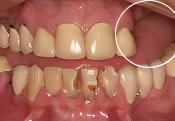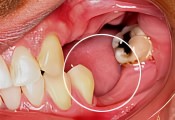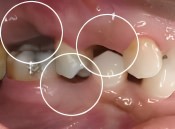What is Dental Bone Loss?
Dental bone loss is the loss of jawbone mass in the area around a tooth or tooth root. As we age, it is normal for our jawbone density to decrease. Dental bone loss can also be a consequence of osteoporosis, a common post-menopausal symptom in women.
Bone loss can occur from wearing dentures and partials as the dentures and partials rub on the bone and cause erosion and bone loss.
Bone loss can also come from bacteria! This is gum disease or periodontal disease, around implants it's called peri-implantitis.
Dental bone loss is a condition that requires immediate attention and proper dental care, as it can lead to more serious problems if left untreated.
At Hampton Dental Associates, we advocate good oral health, not only focusing on the teeth but also proper gum and jawbone health. We offer reconstructive dental services that can help restore your smile.

Early Signs of Bone Loss
Early detection of dental bone is crucial for effective treatment. Here are some common early signs:
- Receding Gums: Gums pulling away from the teeth, making them appear longer.
- Loose Teeth: Reduced support from the jawbone, causing teeth to feel loose.
- Increased Tooth Sensitivity: Heightened sensitivity to hot, cold, or sweet foods due to exposed tooth surfaces.
- Changes in Bite or Tooth Alignment: Shifts in tooth positioning and noticeable changes in your bite.
- Discomfort or Pain: Pain in teeth or gums, especially when chewing.
- Persistent Bad Breath or Bad Taste: Pockets between teeth and gums trapping bacteria.
- Gum Inflammation and Bleeding: Bleeding gums, even with regular brushing and flossing.
- Changes in Denture Fit: Poorly fitting or uncomfortable dentures due to jawbone changes.
- Visible Bone Loss on X-rays: Dental X-rays showing changes in bone density.
What are the common reasons for Dental Bone Loss?
A healthy jawbone structure is essential to good oral health. If the jawbone condition is compromised, your teeth lose their support and can loosen or fall out, even without any other signs of damage or decay. Many factors can contribute to dental bone loss; understanding them will help you take preventive measures.

Tooth Extractions
The amount of jawbone mass is maintained by the teeth embedded in it. When you chew and bite, the force of your teeth stimulates the jaw bone, helping to maintain its integrity. But if you get a tooth removed and don’t replace it with an artificial tooth, the jawbone no longer receives the stimulation in that area. Bone resorption occurs, and the bone slowly breaks down. That is why when a tooth is removed, your dentist should discuss socket preservation or bone grafting with you before the tooth is pulled to avoid more costly bone grafting needs in the future.
Periodontal (Gum) Disease
Bacteria present in the plaque that forms on the surface of the teeth can cause gingivitis, where the gums swell, become red, and bleed. If the condition worsens, gingivitis progresses to periodontitis, where the plaque extends beyond the gum line, and the gum tissue becomes irritated. As inflammation intensifies, separation between the gums and the teeth can create pockets that easily trap bacteria and become more infected.
Chronic inflammation of the gum tissue will cause the bones supporting the teeth to break down. Over time, the teeth in the affected areas will loosen and fall out. Periodontal disease is usually a result of poor oral hygiene and can be prevented with regular cleanings by your dentist, along with good oral hygiene practices at home. Smoking, vaping and chewing tobacco are huge factors in accelerating bone loss!!

Bridges and Dentures
Dental bridges and dentures are common treatments to replace some or all of a person’s missing teeth. Both are very effective in restoring the natural function of teeth while providing very natural-looking results. However, bridges and dentures are often unanchored, leaving a gap between the appliance and the jawbone. The jawbone no longer receives the stimulation it needs to maintain its integrity, resulting in bone loss. In dentures especially, the lack of bone stimulation causes the jawbone mass to decrease continually, requiring regular refitting of the unsupported dentures. Every 3-5 years, dentures must be relined or remade due to the loss of bone structure!
Dental implants can be used with bridges and dentures to make these appliances more permanent. Because they’re implanted into the jawbone, those implants act like normal teeth, creating force against the jawbone when chewing and biting, maintaining bone mass.
Trauma
Tooth trauma can lead to bone loss. If a tooth breaks off, you can no longer bite down with it, and the jawbone is no longer stimulated at the site of that tooth. In addition to knocked out or broken teeth, we also come across cases where a patient’s jawbone has been fractured and has failed to heal, again causing trauma and bone loss.
Issues with Alignment
Even misaligned teeth can result in decreasing jawbone mass. Misaligned teeth create problems with chewing and biting, and over time, this will cause the bone to deteriorate. Proper orthodontic treatment, however, can restore a normal bite and recreate proper bone stimulation.
Tumors
The removal of benign and malignant tumors in the area near the jaw often requires an entire portion of the jawbone to be grafted.
Read more about bone loss in this patient case study.
Bone Loss Treatment
Treating dental bone loss is crucial to maintaining overall oral health and preventing further complications. At Hampton Dental Associates, we offer several effective treatments to address bone loss and restore jawbone integrity.
Bone Grafting
Bone grafting is a common and highly effective procedure for treating dental bone loss. In this technique, Dr. Winter transplants bone tissue to the affected area, which helps regenerate lost bone. This provides a stable foundation for dental implants or other restorative procedures. Bone grafting can significantly improve the structural integrity of the jaw and support the placement of artificial teeth.
Dental Implants
Dental implants are an excellent solution for preventing further bone loss. These implants are embedded into the jawbone, mimicking the natural roots of teeth. The pressure exerted by dental implants during chewing stimulates the jawbone, helping to maintain its density and prevent resorption.
Guided Tissue Regeneration
Guided tissue regeneration (GTR) is a technique that encourages the growth of new bone and gum tissue. This procedure involves placing a special membrane between the bone and gum tissue, allowing the bone to regenerate while preventing unwanted tissue growth. GTR can be particularly effective in treating periodontal disease-related bone loss.
Preventive Care
Regular dental check-ups and maintaining good oral hygiene are essential in preventing dental bone loss. Early detection of issues can lead to prompt treatment, minimizing the extent of bone loss and preserving overall oral health.
See What Our Patients Are Saying...
"Hampton Dental is exceptional, from the service they offer to how they treat you from the moment you enter. They're careful, explain everything to you before beginning (costs especially), and are kind, careful and sensitive. It's hard to explain Dr. Rick. In one word, I would probably say perfectionist. He is. He's precise and meticulous, confident and efficient. He's the best at what he does, and he makes sure you receive the very best. The entire staff is so helpful and friendly. It's quite unique. Going to the dentist is uncomfortable, always will be. But they really endeavor to welcome and treat you well. Choosing Hampton Dental 5 years changed my life. The work they've done, the respect they've shown, the type of people they are... they've made my life better and my future more bright. - Rich W"
Why Choose Hampton Dental Associates, SC?
Dr. Richard Winter is our highly experienced dentist with over 37 years of expertise and a Mastership in the Academy of General Dentistry and Diplomate status in the American Board of Oral Implantologists. We offer a full range of dental services, including treatments for dental bone loss. Our patient-centered approach puts your comfort and satisfaction at the forefront, with a friendly team ready to help you.
Our commitment to continuing education allows us to provide the most current and effective treatments. With our track record of excellence and numerous satisfied patients, Hampton Dental Associates is your trusted choice for expert dental care in Milwaukee.
Frequently Asked Questions
How Is Dental Bone Loss Diagnosed?
Dental bone loss is typically diagnosed through dental X-rays, which can reveal changes in bone density and structure. Your dentist may also thoroughly examine your teeth and gums to assess for any signs of bone loss or periodontal disease.
Can Dental Bone Loss Be Reversed?
While dental bone loss cannot be entirely reversed, treatments such as bone grafting, guided tissue regeneration, and dental implants can help restore lost bone and prevent further deterioration. Early intervention is crucial for the best outcomes.
Can I Finance My Bone Loss Treatment in Milwaukee?
Yes, you can finance your bone loss treatment at Hampton Dental Associates in Milwaukee. We understand dental treatments can be a significant investment, and we are committed to making them accessible to our patients. We offer a variety of financing options to help you manage the cost of your treatment. For more information on our financing plans and how to apply, please visit our Financing Information page.
How Much Bone Loss Occurs Before Teeth Fall Out?
The amount of bone loss required before teeth begin to fall out varies. It depends on several factors, including the overall health of your gums, the stability of your remaining bone, and the presence of any other dental conditions.
Generally, significant bone loss—often more than 30% of the jawbone supporting a tooth—can lead to tooth instability and eventual tooth loss. However, even moderate bone loss can cause teeth to become loose, making early detection and treatment crucial to prevent tooth loss. Regular dental check-ups and X-rays can help monitor bone health and address issues before they become severe.
What Are the Consequences of Untreated Dental Bone Loss?
Untreated dental bone loss can lead to significant oral health issues, including tooth loss, shifting teeth, altered facial structure, and difficulties chewing and speaking. It can also increase the risk of periodontal disease and further bone deterioration.
Are There Any Lifestyle Changes That Can Help Prevent Dental Bone Loss?
Yes, maintaining good oral hygiene, avoiding tobacco use, eating a diet rich in calcium and vitamin D, and staying hydrated can all help prevent dental bone loss. Regular dental check-ups and cleanings are also essential.
How Does Smoking Affect Dental Bone Loss?
Smoking and vaping significantly increases the risk of dental bone loss by reducing blood flow to the gums, impairing the healing process, and promoting the growth of harmful bacteria. Quitting smoking and vaping can greatly improve oral health and reduce the risk of bone loss.
What Role Does Diet Play in Preventing Dental Bone Loss?
A diet rich in calcium, vitamin D, and other essential nutrients supports healthy bone density and oral health. Foods such as dairy products, leafy greens, nuts, and fatty fish can help maintain strong bones. Avoid sugary and acidic foods to protect against tooth decay and gum disease, which also contribute to bone loss.
Can Dental Bone Loss Occur Even With Good Oral Hygiene?
Yes, dental bone loss can occur even with good oral hygiene, especially if there are other contributing factors such as genetics, underlying medical conditions like osteoporosis, or the long-term use of certain medications. Schedule regular dental visits to monitor and address these issues early.
How Often Should I See a Dentist to Monitor for Dental Bone Loss?
We recommend visiting Dr. Winter every six months for routine check-ups and cleanings. However, if you have risk factors for dental bone loss, we may suggest more frequent visits to monitor your oral health closely.
Is Dental Bone Loss More Common in Certain Age Groups or Demographics?
Dental bone loss is more common in older adults, particularly post-menopausal women, due to decreased estrogen levels. It can also be more prevalent in individuals with poor oral hygiene, smokers, those with chronic illnesses like diabetes, and those with a family history of periodontal disease.
Schedule A Dental Bone Loss Consult Today!
If you believe you are experiencing dental bone loss and wish to learn more about our treatment options, or if you want to determine whether you are a candidate for treatment, please call 414-377-5711 to book a personalized consultation with one of our top doctors. You can also click here to send us an Appointment Request Form. Our practice looks forward to serving you!
Call 414-464-9021 for information on any of our services.
Check out our Dental Blog >>
Read our Patient Case Studies >>
Hampton Dental Associates is proud to offer affordable dentistry programs to help you regain your perfect smile.
Learn more about our affordable dentistry options.



